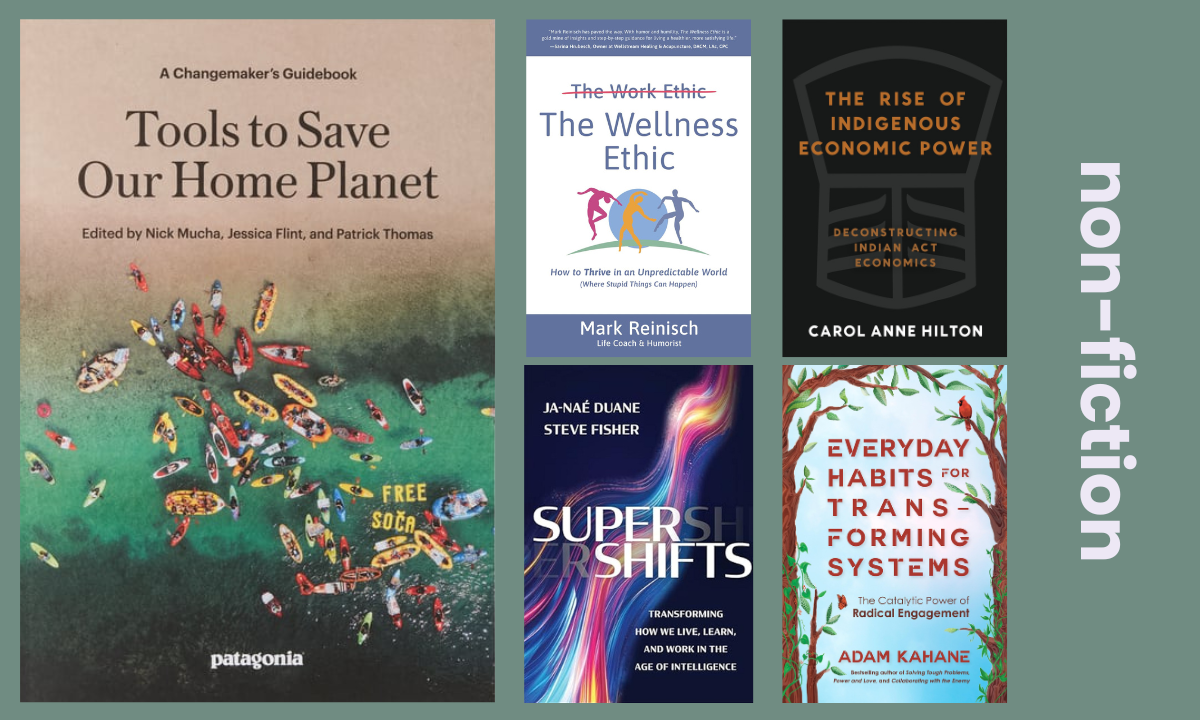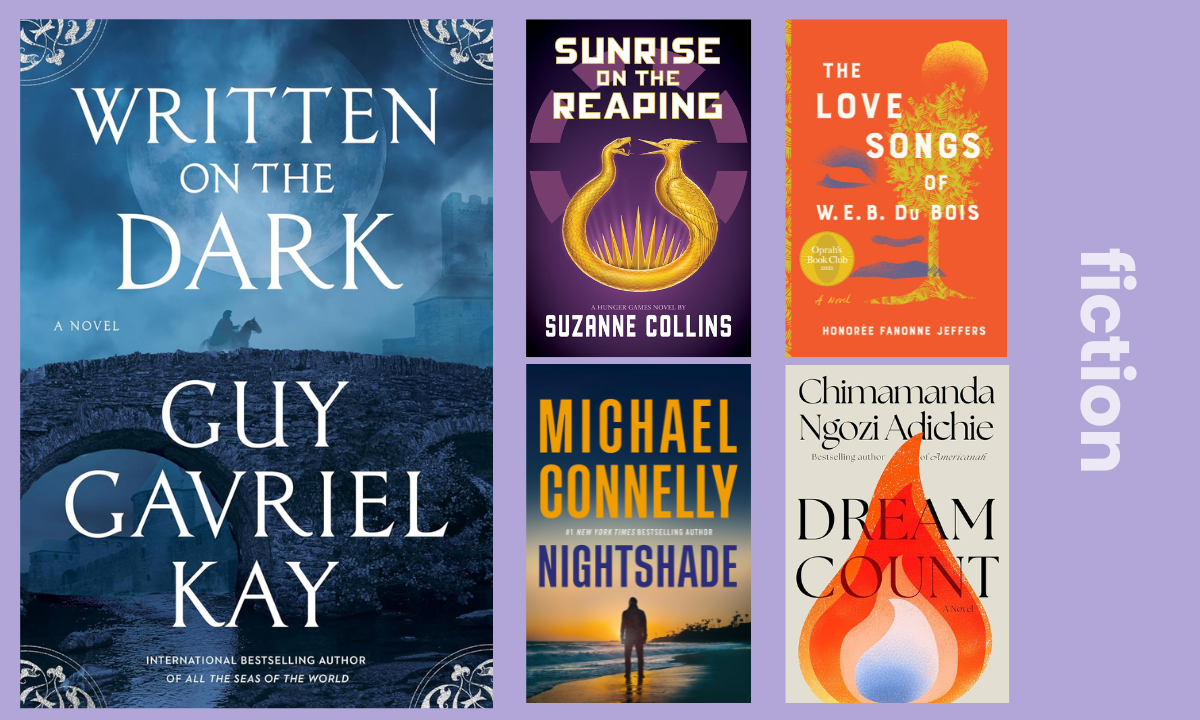From planet-saving to pulp: Our summer reading list for 2025

I love a good reading list.
It’s a blessing and a curse, because I’m always down for an excellent read, but I can’t read fast enough and then my burgeoning bookcase explodes from stress.
Still, that doesn’t prevent me from trying.
Here’s our list of recommended summer reads for 2025, gathered from changemakers (and me):
Tools to Save Our Home Planet: A Changemakers Guide, edited by Nick Mucha, Jessica Flint and Patrick Thomas
One of the latest from Patagonia, Tools to Save Our Home Planet is an essential guide for any activist or non-profit hoping to save the world. It comes replete with case studies, numerous first-hand accounts and practical advice for anyone trying to drive change in their community, whether that’s their street, their city or their planet.
Supershifts: Transforming How We Live, Learn and Work in the Age of Intelligence by Ja-Nae Duane and Steve Fisher
Supershifts explores nine major technological forces—called “SuperShifts”—that are fundamentally reshaping society, work, and personal identity. Using strategic foresight tools and the fictional Sinclair family’s journey, the book guides readers in navigating artificial intelligence, bioengineering, and immersive tech with intention.
It’s both a wake-up call and a toolkit for designing adaptable, future-ready systems in a rapidly evolving world.
The Rise of Indigenous Economic Power: Deconstructing Indian Act Economics by Carol Anne Hilton
This is a powerful critique of the colonial economic systems that have historically excluded Indigenous Peoples in Canada. Building on her earlier work in Indigenomics, Hilton exposes how the Indian Act has constrained Indigenous economic participation and argues for a shift toward Indigenous-led prosperity. She outlines 25 transformative trends—such as land reclamation, infrastructure investment, and green energy leadership—fueling a $100-billion Indigenous economy already in motion.
Hilton presents Indigenomics as a framework for ethical, inclusive growth rooted in Indigenous values, self-determination, and stewardship. It’s essential reading for anyone invested in building a just and prosperous future that centers Indigenous economic sovereignty.
Everyday Habits for Transforming Systems by Adam Kahane (Current Future of Good Book Club selection)
Everyday Habits is a powerful guide for anyone seeking to create meaningful change in complex environments. Drawing from decades of experience in conflict resolution and systems transformation, Kahane introduces seven everyday habits that empower individuals to engage with entrenched systems in radically effective ways.
Kahane illustrates how small, consistent actions—when done with intention—can unlock hidden leverage points and catalyze large-scale transformation.
Haven’t joined our book club? Find out how to do so here.
The Wellness Ethic: How to Thrive in an Unpredictable World (Where Stupid Things Can Happen by Mark Reinisch
This book by Mark Reinisch is a refreshingly candid and humorous guide to living well in a chaotic world. Reinisch challenges the outdated notion of a “work ethic” and instead champions a “wellness ethic”—a mindset that prioritizes nurturing your mind, body, and spirit.
Through relatable storytelling and practical advice, he encourages readers to pursue joy, resilience, and meaningful relationships, even when life throws curveballs.
What sets this book apart is its accessibility and wit. Reinisch simplifies complex wellness concepts using the 80/20 rule, showing how small, intentional actions can yield big results. The Wellness Ethic offers actionable tools without the preachy tone of traditional self-help books.

Dream Count: A Novel by Chimamanda Ngozi Adichie
Named one of 2025’s most anticipated releases by The New York Times, Dream Count is a sweeping, emotionally resonant novel that follows the intersecting lives of four African women—Chiamaka, Zikora, Kadiatou, and Omelogor—during the COVID-19 pandemic. Set across Nigeria and the U.S., the story explores themes of love, motherhood, trauma, and the longing to be truly known. Each woman’s narrative unfolds with raw honesty, revealing how personal histories, cultural expectations, and global crises shape their identities and choices.
Through shifting perspectives and lyrical prose, Adichie examines the fragility of connection and the resilience of the human spirit.
The Love Songs of W.E.B. Du Bois by Honorée Fanonne Jeffers
Honorée Fanonne Jeffers’ The Love Songs of W.E.B. Du Bois is a deeply moving novel that traces generations of African American history through the life of Ailey Pearl Garfield. From the ancestral trauma of enslavement to the contemporary struggles of identity, belonging, and love, the novel is a sweeping epic anchored in the rich cultural traditions and lived experiences of Black communities in the American South.
Jeffers uses archival detail, ancestral voices, and the poetic writings of W.E.B. Du Bois to craft a story that is both intimate and historical, personal and communal.
Nightshade by Michael Connelly
For those of you who like a little pulp with your fiction, we recommend Nightshade by Michael Connelly. Connelly introduces Detective Sergeant Stilwell, a principled but exiled investigator reassigned to the seemingly tranquil Catalina Island after clashing with corrupt colleagues in Los Angeles.
What begins as a routine post quickly spirals into a gripping murder investigation when the body of a young woman, Leigh-Anne Moss, is discovered anchored beneath the harbor. Connelly crafts a layered mystery that blends atmospheric tension with procedural precision.
Stilwell’s pursuit of justice pits him against both the island’s elite and his own department’s politics, forcing him to navigate personal and professional minefields.
Written on the Dark by Guy Gavriel Kay
For real escapism, check out Written on the Dark by Canada’s preeminent fantasy author Guy Gavriel Kay.
Written on the Dark is a richly layered historical fantasy set in the fictional kingdom of Ferrieres, inspired by medieval France. The story follows Thierry Villar, a tavern poet whose sharp wit and reluctant courage thrust him into the heart of political intrigue after witnessing a duke’s assassination. As Thierry navigates court conspiracies, war, and shifting alliances, he’s forced to reconcile his artistic ideals with the brutal realities of power.
Kay’s prose captures both the icy grip of winter and the warmth of human connection, weaving a tale where poetry and politics collide.
Sunrise on the Reaping by Suzanne Collins
This one is totally for your kids. Yeah.
But, you know, as a great parent, you really should read it to make sure it’s appropriate for your teen.
Sunrise on the Reaping by Suzanne Collins is a gripping return to the dystopian world of Panem, set during the 50th Hunger Games—also known as the Second Quarter Quell. This prequel centers on a 16-year-old Haymitch Abernathy, long before he became Katniss Everdeen’s sardonic mentor.
Reaped after a tragic twist during the selection ceremony, Haymitch is thrust into an arena twice as brutal, with double the tributes and a Capitol more ruthless than ever. As he navigates deadly alliances, poisonous landscapes, and Capitol manipulation, Haymitch’s wit and defiance begin to shape the rebel spirit that will echo through the series.

